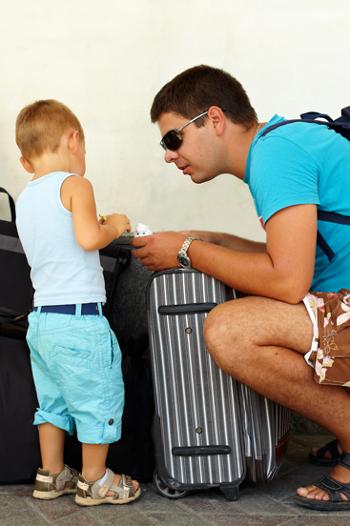Going on holidays
Duration/age

The holidays are approaching - are you going away? If you are, talk to your child about where you are going and the jobs that need to be done before you go.
We are going camping for Easter. We can’t take the dog and cat with us so we need to organise someone to look after them while we are away.
We are going on a big trip to Queensland for 2 weeks. It is going to be very hot and we can swim. We need to pack our bathers and take clothing for hot weather.
Make a list of the jobs that need to be done before you go away. Talk to your child about the jobs and see if they can be grouped together. You could group the jobs by what needs to be done outside, the things that need to be bought for the trip, or the people you need to contact. Once you have made the list ask your child to help mark on the calendar when the jobs need to be done.
We need to make a list of people to ring before we go away. We have to cancel the newspaper and they need 2 weeks’ notice before the date. We also need to ring Nana and ask if she can water the pot plants while we are away.
When we go camping we need to take all of the food with us. There won’t be a fridge, so we need to buy food that doesn’t have to be kept cold.
Materials you will need
- Calendar
- A list of jobs to do
Alternative tools
- Suitcase
Skills this activity improves
Why does this matter?
Talking about going away and what needs to happen before the holiday helps children to develop skills in planning, sequencing and measurement.
As you talk about what you’ll be doing and the order you’ll do it, your child will be learning about sequencing and predicting. As they explore the sequence of events they are exploring time and how long events take to complete.
Talking together about the jobs to do and when to do them helps children to explore the different ways we can measure time. Time can be measured by a clock, with numbers or by counting how many days till something happens.
What does this lead to?
When you talk about time as an event or a routine, children are developing an understanding that we can describe time using different language. Time can be represented as a number on a clock, something that happens regularly or as a one-off event.
The language we use to describe time will help children to plan for an event and know when and how often an event happens.
Language to use
- Calendar, day, week, weekend
- Time, event, schedule, routine, regular
- Monday, Tuesday, Wednesday, Thursday, Friday, Saturday, Sunday
- Travel, destination
- Holiday, trip, camping
- Drive, fly, bus, train
- Transport
- Luggage, packing, suitcase, bag, backpack, esky
- Food, shopping
- Planning, organising, list
Questions to use
- How will we travel to where we are going?
- Will the weather be the same or different when we go camping?
- What clothes do we need to pack for a trip to the beach?
- If we don’t have a fridge to keep the food cold what will we eat?
- Who will look after the animals while we are away?
- Why do plants need someone to look after them?
Useful tips
- You might also like to take a look at the activities Travelling with children and What time do we need to be there?
- Use a calendar to mark the jobs for different family members. If you use a different colour for each person your child will be able to see their jobs easily.
- Place a sticker on the calendar on the day you are leaving. Mark off each day as you get closer to the big event.
- Remember to talk to your child in your home language.
More ideas
- Make a visual list of jobs your child needs to do before you go away.
- Ask your child to help pack a special bag to take away with you. Ask them to pack special things they want to play with while they are away.
Variation by age
Three to five year olds
- Take pictures of getting ready for the holiday. You can include them in a storybook about your trip.
- Borrow books from the local library about going on holidays.
- Sit with your child and google the place you are going. Talk about what the weather will be, what there is to do and what you will need to pack.
- Ask your child to help pack their bag. Can they find their bathers and thongs?


